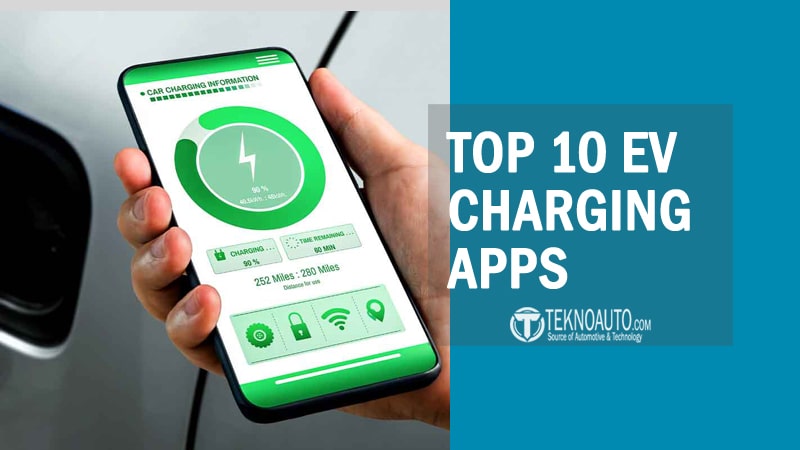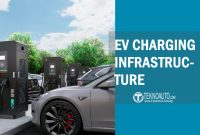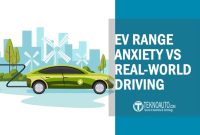Range anxiety—fear of running out of battery before reaching a charging station—remains one of the biggest hurdles for electric vehicle (EV) adoption. Even as battery technology improves and public charging networks expand, many EV drivers still feel uncertain about whether they can complete longer trips without hassle. This is where EV charging apps step in to change the game.
By offering real-time information, intelligent route planning, and seamless payment systems, the top EV charging apps have become essential tools for drivers who want to eliminate range anxiety while driving. These apps are no longer just maps to charging stations; they are smart driving companions that provide assurance, convenience, and control in every journey—whether across town or across countries.
From urban commuters to long-distance travelers, knowing where to charge, how long it will take, and whether a charger is available makes all the difference. In this article, we’ll explore the top 10 EV charging apps to eliminate range anxiety, dissect their features, and show you how to choose the one that best fits your needs on the road.
Why You Need an EV Charging App on the Road
Electric vehicles offer an incredible driving experience, but without proper planning, even the most advanced EVs can leave drivers stranded. That’s where EV charging apps become a necessity rather than a luxury. These apps are built to provide up-to-date insights about charger availability, compatible connectors, wait times, and pricing—all from the convenience of your phone.
While built-in navigation systems in EVs often provide basic charging information, dedicated EV charging apps go much further. They aggregate data from multiple charging networks, show user-generated reviews and photos, and often include real-time updates about charger status. This added layer of transparency helps drivers avoid detours, reduce waiting time, and feel more confident while traveling unfamiliar routes.
Beyond convenience, these apps also contribute to smarter trip planning and energy forecasting. Whether you’re commuting daily or setting off on a cross-country road trip, a reliable EV charging app can help you optimize routes, reserve charging slots ahead of time, and ensure you always stay one step ahead of your vehicle’s range. That’s why choosing the right app is essential for eliminating range anxiety while driving.
Why You Need an EV Charging App on the Road
Unlike traditional vehicles that rely on a vast network of gas stations, EVs demand more strategic planning. Drivers must consider not only where to charge, but whether the station is compatible, available, and fast enough for their needs. This is where EV charging apps play a vital role—streamlining every aspect of the charging experience from search to payment.
These apps are no longer optional tools; they are essential companions for anyone behind the wheel of an electric vehicle. Below are the most critical features that make these apps indispensable on the road.
Real-Time Charging Station Locator
Finding a nearby charging station can be stressful, especially when your battery level is critically low. EV charging apps solve this by using your GPS location to automatically display the nearest SPKLU (charging stations), complete with filters for connector types, charging speeds, and network compatibility. This smart locator ensures you never waste time looking for a compatible station manually.
Many apps allow advanced filtering, helping you narrow results by availability, fast-charging capability (like DC Fast or Ultra-Fast), and even amenities near the station. This targeted search not only saves time but also improves your overall charging experience—especially in dense urban areas or unfamiliar locations.
Charging Station Status and Availability
A top pain point for EV users is arriving at a station only to find all chargers in use. That’s why live availability is a must-have feature. EV charging apps display whether a port is currently occupied or free, using real-time data from charging networks. Some apps also tap into crowdsourced information, where users can confirm if a charger is broken, blocked, or operational.
The combination of network integration and community input enhances the reliability of this information, helping you avoid unnecessary detours or waiting in line at busy locations. It transforms trip planning from guesswork into strategy.
Integrated Payment Systems
Modern EV drivers expect a seamless, cashless experience—and charging apps deliver by integrating popular payment methods like e-wallets, credit cards, and PayPal. Once linked, you can pay for charging sessions instantly through the app, without fumbling for cash or swiping cards at the terminal.
Beyond convenience, many apps also track your charging history, store digital receipts, and break down costs per session. This transparency builds trust and helps users manage their monthly energy expenses better—especially for fleet drivers or those using EVs for work.
Smart Route Planning
Route planning is where EV charging apps truly shine. Advanced platforms calculate not just directions, but also battery consumption, factoring in elevation, traffic, and speed. Based on your current charge level, the app recommends optimal stops along your route—complete with time estimates and remaining battery percentage at each checkpoint.
This functionality eliminates the anxiety of running out of power mid-trip. It’s especially useful for longer journeys, where every charging stop needs to be efficient and strategically timed.
Notification and Booking System
To round out the experience, the best apps offer smart notifications. These can include reminders when your charge is complete, alerts for nearby fast chargers, or even prompts to move your car once a session ends. Such features prevent charger hogging and ensure better availability for all users.
Some networks also offer advance booking features, allowing drivers to reserve a charging slot ahead of arrival. This is crucial during peak hours or in high-demand locations, giving users peace of mind and saving valuable time on the road.
Key Features to Look for in EV Charging Apps
Not all EV charging apps are created equal. Some focus on basic station maps, while others offer a full suite of features designed to eliminate range anxiety altogether. Choosing the right app can dramatically improve your EV driving experience, especially during longer trips or when charging infrastructure is limited.
Below are the essential features that a high-quality EV charging app should offer—each one contributing directly to convenience, reliability, and confidence while on the road.
Live Charging Station Status
Real-time data is non-negotiable. The best EV charging apps provide live updates on whether a charger is currently available, in use, or out of service. This reduces unnecessary detours and helps drivers avoid the frustration of arriving at an occupied or offline station.
Apps that integrate directly with charging networks offer more reliable data than those that rely solely on user submissions. However, crowdsourced reports from active users can add an extra layer of insight, such as whether a charger is blocked or malfunctioning.
Smart Route Planner
A powerful route planner doesn’t just get you from point A to B—it ensures you arrive with enough charge. This feature calculates energy consumption based on your EV model, terrain, weather, and driving speed. It also recommends the best places and times to recharge along the way.
By factoring in battery drain, station availability, and estimated charging time, smart planners eliminate guesswork and make long-distance EV travel far more predictable and stress-free.
Integrated Payment Gateway
A seamless payment experience is a must-have. Modern EV charging apps support various payment methods, including e-wallets, credit cards, and even Apple Pay or PayPal. This allows you to charge and go without fumbling through different apps or interfaces.
Moreover, integrated billing history gives users full transparency. You can view past sessions, track total energy consumption, and even download receipts—making it ideal for both personal and business use.
Multi-Network Compatibility
No single charging provider dominates every region. That’s why the best EV charging apps support multiple networks, allowing you to roam freely without needing separate apps for each operator.
Apps like PlugShare and ChargeMap aggregate data across dozens of networks, so you always have access to a broader set of charging stations regardless of who operates them.
Booking and Notification System
Nothing beats the peace of mind of knowing a charger is reserved for you. Some advanced apps allow users to book time slots at specific stations—especially useful during peak travel seasons or in dense urban areas.
Notifications are equally helpful. Whether it’s a reminder that your charge is complete, an alert about a newly available nearby charger, or a warning about station outages, proactive updates make the charging process smooth and efficient.
Table: Essential Features in EV Charging Apps
| Feature | Short Description | Main Benefit |
|---|---|---|
| Live Status | Real-time charger availability info | Avoid wasted time at busy stations |
| Route Planner | Power-aware travel planning | Optimizes charging stops and routes |
| Payment Gateway | Integrated cashless payments | Faster sessions, better billing clarity |
| Multi-Network Support | Access to multiple charging providers | Greater flexibility and roaming freedom |
| Booking & Notifications | Reserve slots and receive real-time alerts | Reduce wait times and charging stress |
Top 10 EV Charging Apps
As EV adoption grows worldwide, the demand for smart, reliable charging apps has become more pressing than ever. Whether you’re commuting within a city or crossing country borders, choosing the right app can make or break your driving experience. These apps offer much more than just maps—they combine route planning, payment integration, real-time station data, and personalized user insights to remove guesswork and reduce range anxiety altogether.
The following top 10 EV charging apps in 2025 stand out for their performance, features, and user experience. Each app offers unique strengths depending on your driving habits, location, and EV model.
1. PlugShare
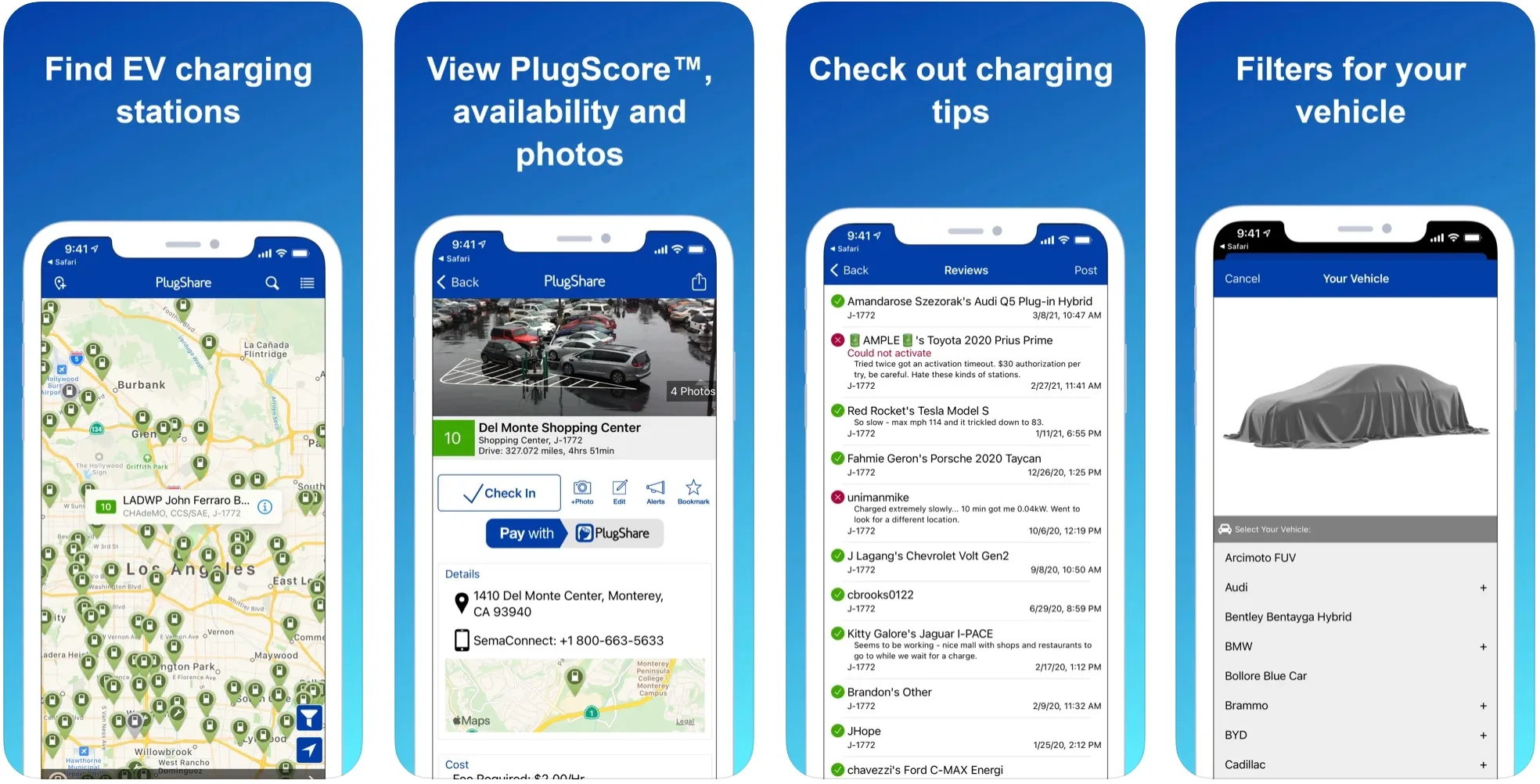
PlugShare is known for its extensive, crowdsourced charging station database. It allows users to leave reviews, upload photos, and report live charger availability—making it one of the most trusted community-driven apps in the EV space.
With support for multiple charging networks and detailed filter options, PlugShare is perfect for drivers who travel frequently or drive across unfamiliar regions. Its global coverage and strong community engagement set it apart.
2. ChargePoint
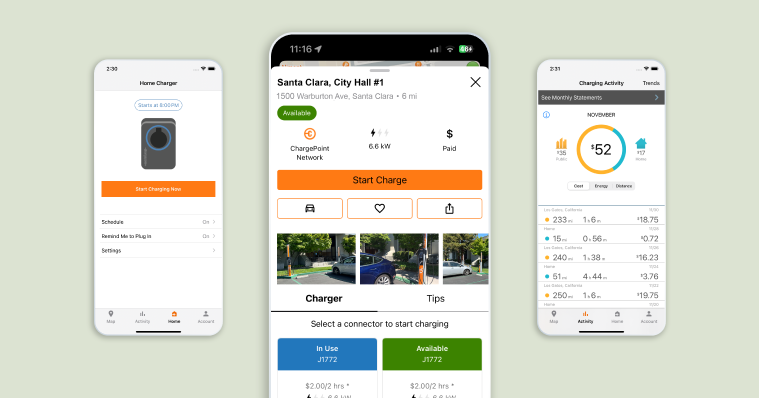
ChargePoint combines hardware integration with a sleek, intuitive app. Users can locate ChargePoint and partner stations, initiate charging sessions with a tap, and view their charging history all in one place.
The app also supports RFID cards and vehicle pairing, giving users more control and automation. Its wide presence across North America and Europe makes it a dependable everyday choice.
3. Electrify America
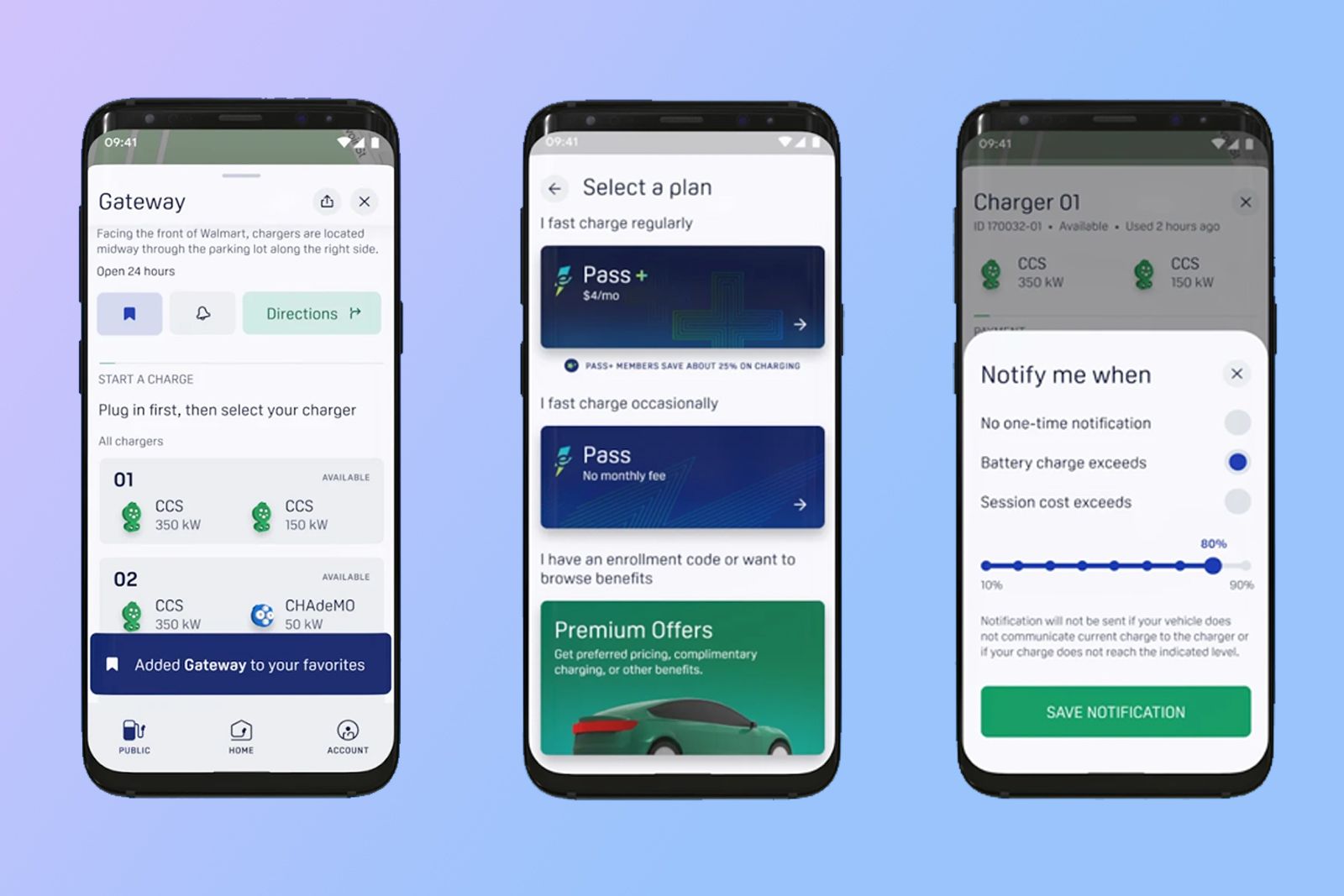
Electrify America focuses on high-speed charging, offering ultra-fast DC chargers suitable for long-range EVs. The app enables users to locate stations, check availability, initiate charging, and make payments within seconds.
It also includes a rewards system, providing incentives for frequent users. With an emphasis on speed, convenience, and nationwide coverage in the U.S., it’s ideal for highway driving.
4. EVgo
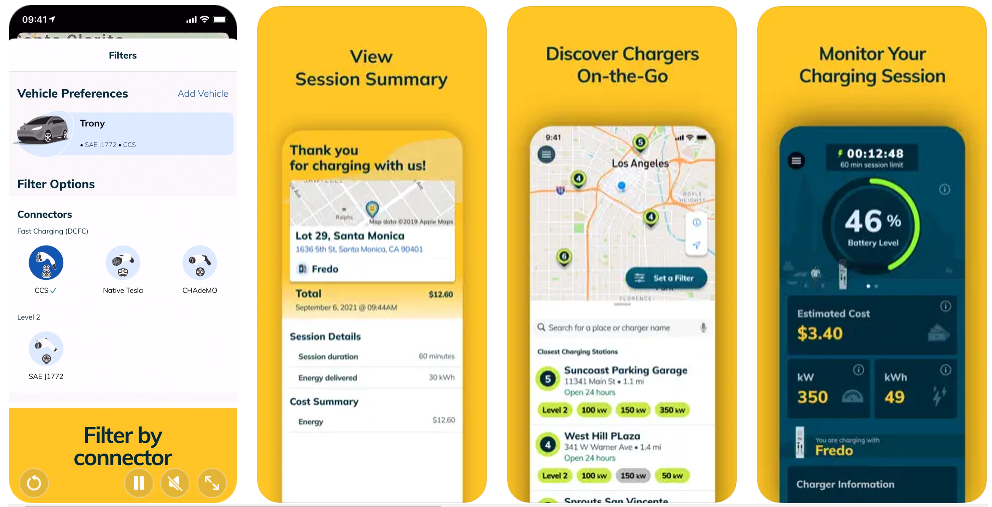
EVgo is especially popular among city dwellers due to its dense network of urban chargers. Its app offers station location, real-time availability, and a seamless reservation system that helps users avoid waiting in line.
The user interface is simple, and the ability to initiate sessions directly from the app makes it ideal for quick, everyday use. Many locations also offer fast chargers at retail centers or office hubs.
5. Shell Recharge
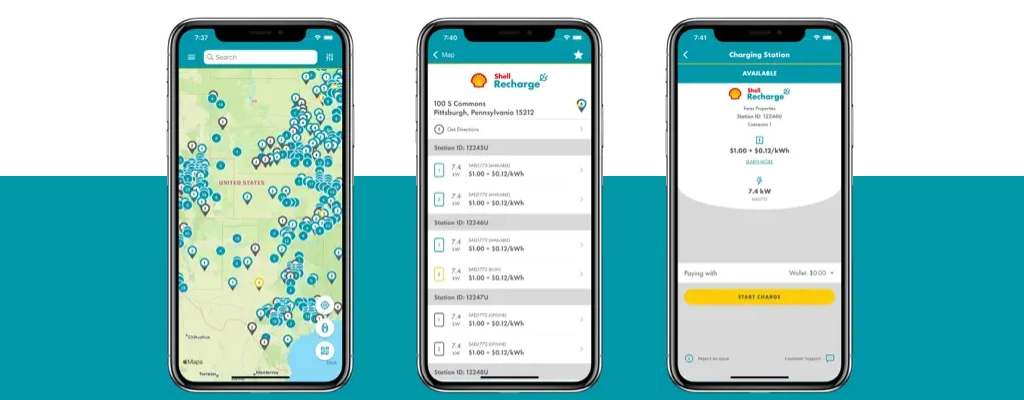
Shell Recharge marks the energy giant’s transition into the EV space. The app connects users to Shell’s expanding charging network, many of which are co-located at existing fuel stations for added convenience.
With a built-in navigation feature and real-time availability data, Shell Recharge makes charging while traveling straightforward. Its integration with Shell loyalty programs adds extra appeal.
6. A Better Routeplanner (ABRP)

ABRP is the preferred choice for EV drivers planning long-distance or cross-country trips. Unlike other apps, it provides hyper-accurate battery and route predictions, factoring in terrain, temperature, driving style, and vehicle specs.
It’s particularly favored by experienced EV drivers looking for maximum efficiency and minimal charging stops. ABRP’s deep technical customization makes it unique among route planning tools.
7. Tesla App (For Tesla Users)
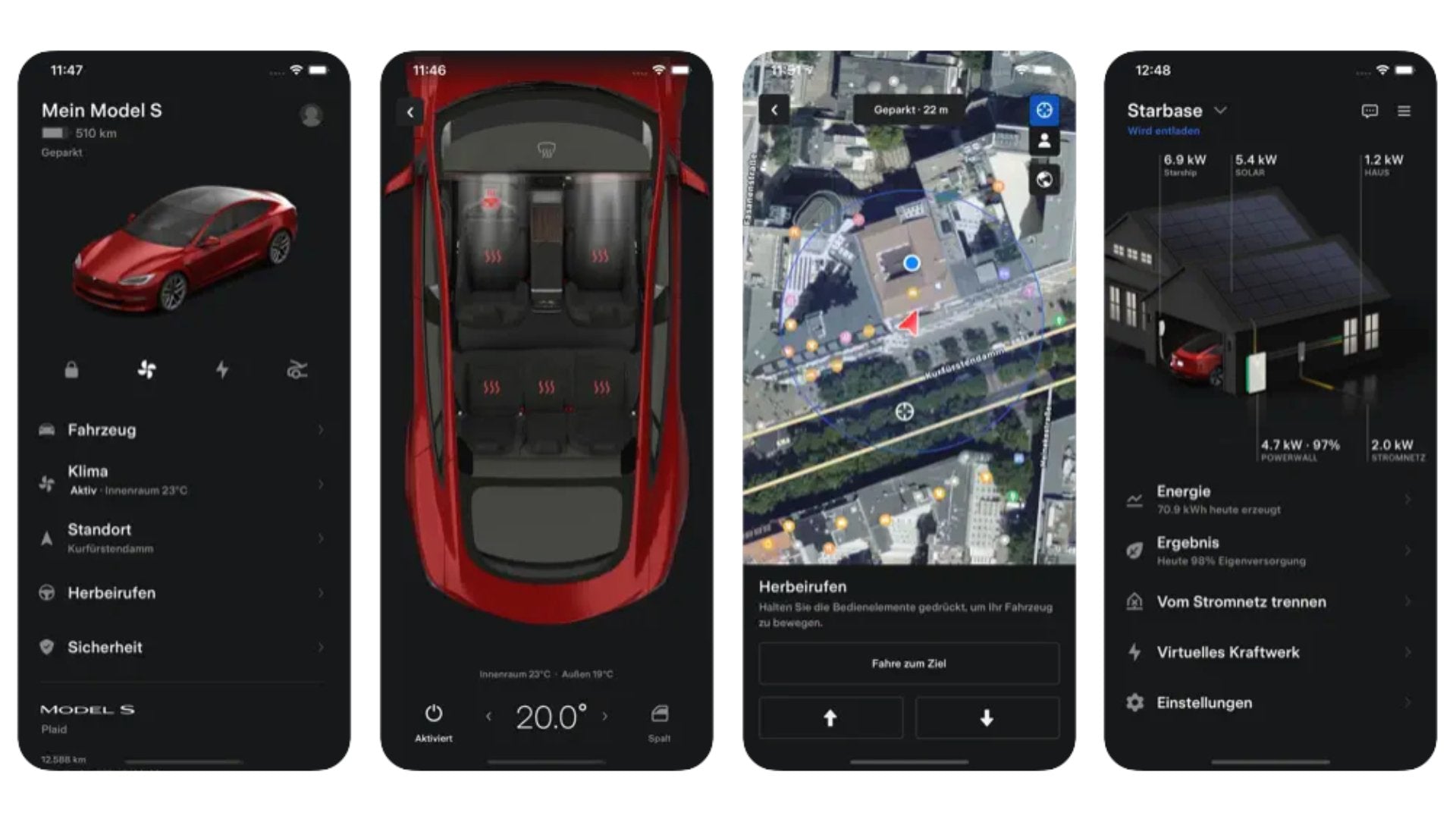
Designed specifically for Tesla vehicles, this app offers a seamless interface that integrates deeply with the car’s systems. It supports charging control, navigation to Superchargers, real-time battery stats, and even remote start/stop for charging.
Tesla drivers enjoy the convenience of built-in maps showing Supercharger locations with availability data. The closed ecosystem ensures a highly optimized experience that’s hard to beat—if you drive a Tesla.
8. ChargeMap

ChargeMap is a favorite in Europe, especially for EV drivers crossing borders. It supports multi-language interfaces, extensive map filters, and real-time availability data across a wide range of European networks.
Its strength lies in consolidating data from numerous providers into one intuitive interface, making it easier for drivers to charge in unfamiliar countries without facing compatibility issues.
9. EVHotels

EVHotels takes a unique approach by combining charging station search with hotel bookings. Perfect for road trips, this app helps EV travelers plan overnight stays at hotels with charging facilities.
It’s ideal for family vacations or business trips where overnight charging is essential. The app also offers user reviews, hotel amenities, and direct booking features.
10. NextCharge
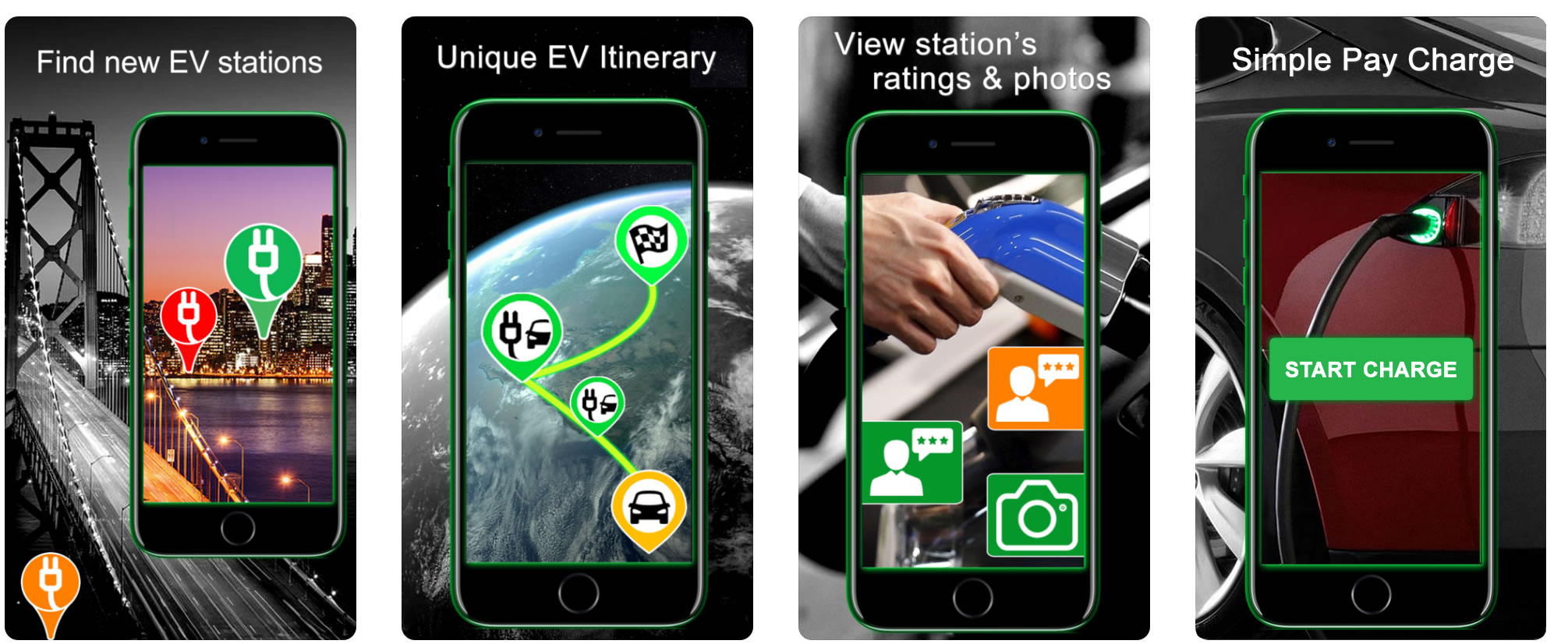
NextCharge offers a clear interface and reliable database of charging stations across Europe and beyond. It provides detailed status updates, pricing info, and direct navigation integration, helping drivers avoid unavailable or incompatible stations.
Its offline mode allows access to maps even in low-signal areas—an essential feature for rural EV trips or international travel where mobile data may be inconsistent.
Comparison Table: Top 10 EV Charging Apps
| App Name | Supported Platforms | Key Features | Network Coverage | Payment Options | Booking Feature | User Rating (2025) |
|---|---|---|---|---|---|---|
| PlugShare | iOS, Android, Web | Crowdsourced reviews, live availability, global station maps | Global, multi-network | N/A (Redirects to network providers) | No | 4.8/5 |
| ChargePoint | iOS, Android, Web | RFID support, charge history, vehicle integration | North America, Europe | Credit card, in-app wallet, RFID | Yes (some stations) | 4.7/5 |
| Electrify America | iOS, Android, Web | Ultra-fast charging, rewards, real-time availability | United States | Credit card, Apple Pay, Google Pay | Yes | 4.5/5 |
| EVgo | iOS, Android, Web | Urban focus, station reservation, session tracking | United States (urban areas) | Credit card, PayPal, EVgo account | Yes | 4.4/5 |
| Shell Recharge | iOS, Android | Real-time data, Shell loyalty integration, navigation | Europe, expanding globally | Credit card, Shell card, app wallet | Yes | 4.3/5 |
| A Better Routeplanner (ABRP) | iOS, Android, Web | Advanced route planning, custom vehicle profiles, battery prediction | Global | N/A (route planner only) | No | 4.6/5 |
| Tesla App | iOS, Android | Full vehicle integration, Supercharger control, remote charge start/stop | Tesla Supercharger Network | Linked Tesla account | No (auto-routing) | 4.9/5 |
| ChargeMap | iOS, Android, Web | Real-time availability, multi-language, wide map filters | Pan-European | Credit card, app wallet | Yes | 4.6/5 |
| EVHotels | iOS, Android, Web | Charging + hotel booking, user reviews, amenity filters | North America, Europe | Credit card | Yes (via hotel) | 4.2/5 |
| NextCharge | iOS, Android | Offline maps, station status, pricing info, navigation | Europe, expanding internationally | Credit card, PayPal | No | 4.3/5 |
Real-World Scenarios Where Charging Apps Make a Difference
While EV charging apps are packed with advanced features, their real value becomes most apparent in real-world driving conditions. From busy urban streets to long stretches of interstate highways and even international road trips, the right app can save time, reduce stress, and keep you fully in control.
Let’s break down how EV charging apps directly benefit different types of EV drivers, depending on their daily routines and mobility needs.
Urban Commuters
For drivers navigating crowded city streets, finding an available charger near work, malls, or public parking is often a daily challenge. EV charging apps simplify this task with real-time maps that pinpoint available chargers based on your GPS location.
In addition to availability, these apps offer instant updates on charging status, queue lengths, and pricing—making it easier to decide whether to charge now or wait. Push notifications also help remind users when charging is complete, helping avoid overstay fees in high-demand areas.
Long-Distance Drivers
Range anxiety hits hardest during long drives between cities or across states. That’s where smart route planning becomes essential. EV charging apps like ABRP or Tesla’s built-in software predict battery consumption across the journey and suggest optimal stops for charging.
By integrating live traffic data, charger availability, and estimated charging durations, these apps allow drivers to plan with confidence. Some even estimate how much battery you’ll have left when you arrive at each station, eliminating the guesswork and making long road trips worry-free.
Cross-Border EV Travel
Traveling across country borders introduces complexity—not just in road rules but also in charging infrastructure. In Europe, for example, multiple charging networks operate under different systems, payment platforms, and languages.
EV charging apps like ChargeMap or PlugShare solve this by offering multilingual support, broad network integration, and currency-friendly payment gateways. This ensures that travelers can locate compatible stations, read local reviews, and charge without friction, even in unfamiliar territories.
Data Privacy and Security Concerns in Charging Apps
While EV charging apps make driving more convenient and reduce range anxiety, they also raise valid concerns about how personal data is collected, stored, and shared. These platforms often gather sensitive information—such as your real-time location, vehicle details, and payment credentials—that, if misused or leaked, could compromise your privacy and safety.
Understanding what types of data charging apps collect and how that data is handled is essential for every EV driver. Responsible use begins with informed decisions.
What Kind of Data Do EV Charging Apps Collect?
Most EV charging apps collect several categories of user data to function optimally:
- Location Data: To provide accurate station recommendations and route planning, apps often track your GPS location in real time.
- Vehicle Information: Apps may store details about your EV model, battery capacity, charging habits, and even VIN numbers.
- Payment Methods: Many platforms save payment credentials such as credit card numbers or e-wallet IDs for fast transactions.
- Usage History: Charging sessions, station preferences, travel patterns, and more can be logged to personalize your experience.
While this data can enhance usability, it also makes these apps potential targets for misuse if proper security isn’t enforced.
Are Location and User Data Shared with Third Parties?
One of the most critical concerns is whether EV charging apps share or sell user data to third-party advertisers or partners. Some apps may anonymize and aggregate data for analytics purposes, while others might store precise user behavior and sell it for commercial gain.
In some cases, apps may retain location history or usage patterns for extended periods—even after you’ve stopped using the app. This data could be accessed by advertisers, insurance companies, or unauthorized actors if adequate safeguards aren’t in place.
Always read the app’s privacy policy carefully. Look for red flags like vague language about “partners” or indefinite data retention timelines.
How to Protect Your Privacy When Using EV Charging Apps
Fortunately, there are steps you can take to maintain control over your personal data while still enjoying the benefits of EV charging apps:
- Review App Permissions: Only grant access to data that is necessary for the app’s core features. Disable background location tracking if not essential.
- Read the Privacy Policy: Focus on sections explaining how data is collected, stored, shared, and how long it is retained.
- Use Encrypted Connections: Ensure the app uses HTTPS and encrypts all transactions and account data.
- Choose Apps with Good Security Practices: Prefer apps with two-factor authentication (2FA), regular security updates, and transparent privacy practices.
- Avoid Public Wi-Fi During Transactions: If possible, use cellular data or a VPN to avoid exposing your payment information on unsecured networks.
Being proactive about data privacy doesn’t mean sacrificing convenience—it means staying informed and protected.
The Future of EV Charging Apps
As electric vehicles continue to evolve, so too must the digital tools that support them. EV charging apps are no longer just utilities for locating plugs—they’re becoming an integral part of a smarter, greener energy ecosystem. Emerging technologies such as smart grids, wireless charging, and vehicle-to-grid (V2G) systems are pushing these apps into new frontiers that promise to transform how we think about mobility, energy, and sustainability.
Let’s take a closer look at how EV charging apps are expected to shape the next generation of electric mobility.
Integration with Smart Grids & AI
One of the most anticipated developments is the deep integration between EV charging apps and national smart grid systems. These grids use real-time data and AI algorithms to balance energy demand across regions, ensuring efficient power distribution and avoiding overloads.
Future-ready charging apps will be able to predict the cheapest and cleanest times to charge your vehicle, offering you dynamic pricing options based on grid load and electricity sources. For example, users might receive a notification that late-night charging will be 30% cheaper due to surplus renewable energy.
This integration also enables load-balancing—charging apps could coordinate with the grid to reduce energy draw during peak hours, helping both consumers and energy providers achieve sustainability goals.
Wireless Charging Integration
Another exciting frontier is the seamless integration of wireless charging technology into EV apps. As wireless pads become more common in urban centers, parking lots, and even highways, apps will be able to automatically detect compatible chargers and begin the charging process with minimal user interaction.
This technology not only eliminates the need for cables but also opens doors to opportunistic charging—topping up your EV’s battery while stopped at traffic lights or in shopping centers, without ever leaving the driver’s seat. EV charging apps will act as intelligent mediators, managing sessions, authenticating users, and tracking performance in the background.
Vehicle-to-Grid (V2G) Capabilities
Looking even further ahead, charging apps are expected to play a pivotal role in V2G systems, where EVs don’t just consume energy—they give it back. Imagine your EV supplying electricity to your home during peak hours or feeding power back into the grid during emergencies.
Charging apps will soon support V2G capabilities by:
- Monitoring energy reserves in your EV.
- Letting you set preferences (e.g., “only supply energy if battery is above 60%”).
- Coordinating discharge schedules with utility companies for optimal compensation.
This level of integration transforms your EV from a mere vehicle into a mobile power asset, helping stabilize national grids and lower household energy bills. With the right app, drivers could even earn incentives for participating in grid support programs.
Conclusion
Electric vehicle ownership is no longer defined by the limitations of charging range—it’s shaped by how smartly drivers use digital tools like EV charging apps. These apps are more than just maps for plug points; they’re powerful platforms that offer real-time station data, route planning, payment integration, and smart notifications to make every drive more predictable and stress-free.
By choosing the right EV charging app, drivers gain control, confidence, and convenience, whether commuting in the city, embarking on a long-distance road trip, or even crossing national borders. The top-rated apps we’ve explored—like PlugShare, ChargePoint, ABRP, and others—are helping redefine the EV experience and eliminate the anxiety that once defined early adoption.
As we look ahead, the role of these apps will only grow more significant. From smart grid integration and wireless charging to V2G innovations, they’re set to become critical nodes in the broader mobility and energy ecosystem. For new EV users, selecting the right app isn’t just helpful—it’s essential.
So if you’re ready to drive electric with peace of mind, start by downloading one of the top EV charging apps. Your future on the road just got smarter.
Frequently Asked Questions (FAQ)
What is the best EV charging app in 2025?
There’s no one-size-fits-all answer, but apps like PlugShare, ChargePoint, and A Better Routeplanner (ABRP) are consistently rated among the best for their accuracy, feature set, and broad compatibility across networks.
Are EV charging apps free to use?
Most EV charging apps are free to download and use, though some offer premium features or subscription tiers for advanced planning, analytics, or exclusive charging network access.
Can I reserve a charging station slot through these apps?
Yes, many top EV charging apps like EVgo and ChargeMap offer real-time booking options, allowing you to reserve a charger ahead of time and avoid unnecessary wait times.
How accurate is the charging station data in these apps?
Accuracy varies by app, but the best platforms combine live data from charging networks with crowdsourced user feedback to ensure reliable, up-to-date information about charger availability and condition.
Is it safe to share my location with EV charging apps?
Most reputable EV charging apps follow strict privacy policies. However, it’s wise to check what permissions the app requests, review its privacy settings, and ensure that location sharing is used only when necessary.

